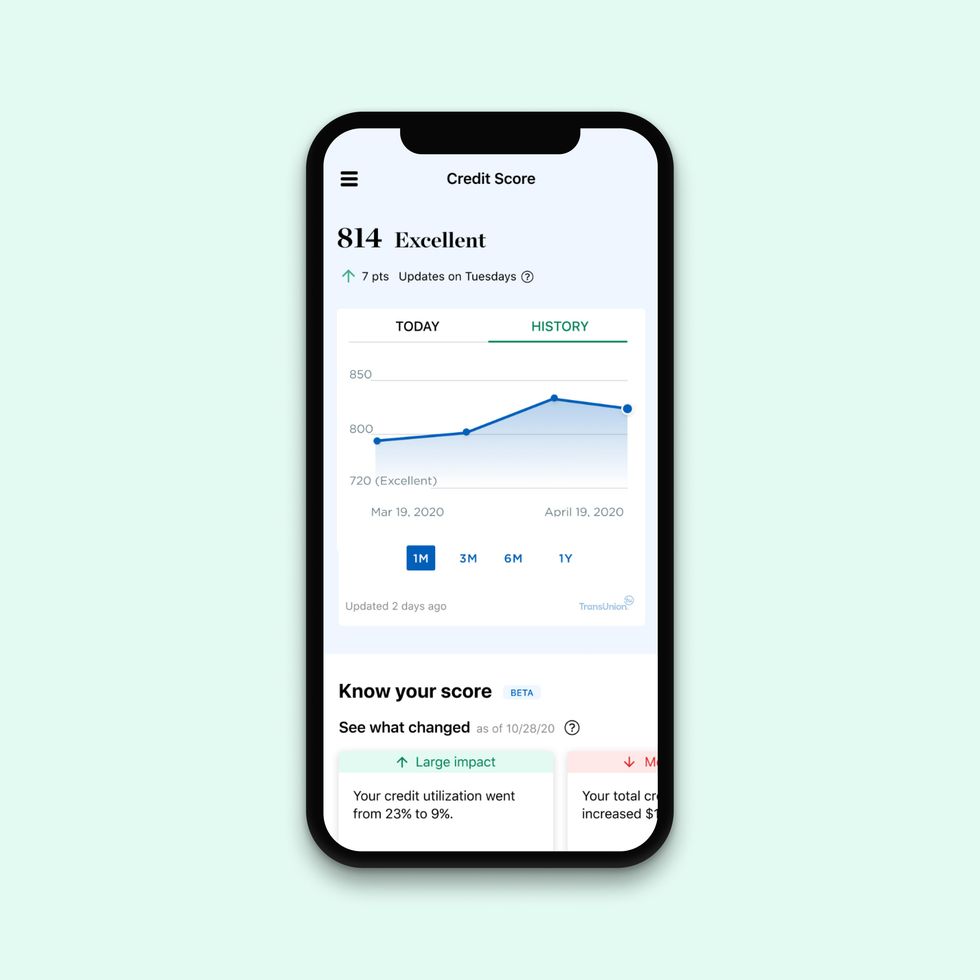
Ah credit scores, the adult version of a GPA. Isn't it incredible to think about how little we learned about this elusive number in school? As someone who was required to take an economics course in college, I can assure you matters of personal finance were simply not covered. And with so many credit score horror stories a quick Google search away, it's hard to know what actually impacts your score versus what's good old internet lore.
Fortunately, we've got an in-the-know expert on speed dial who can walk us through common credit score myths to avoid, plus how to aim for that oh-so-coveted "perfect" credit score. Keep reading as Kimberly Palmer a personal finance expert at NerdWallet, answers frequent credit score questions and more to help set us all on a path toward financial freedom. If you're not familiar with NerdWallet, it is a personal finance site and app helping consumers make the best financial decisions, and that includes providing insight and ideas for how to build your credit score.
But first, what is considered a good credit score?
Before we dive into how to build your credit score, we want to ensure you have a baseline of information to best assess your current financial status. As a reminder, your credit score estimates how likely you are to repay borrowed money and pay bills, and typically runs on a scale of 300 to 850. Though creditors set their own standards for scores they'll approve, these are the general ranges:
- A score of 720 or higher is generally considered excellent credit.
- A score between 690 and 719 is considered good credit.
- Scores between 630 and 689 are fair credit.
- And scores of 629 or below are poor credit.
Now, onto the expert guidance and myth-busting.

Myth #1: If you have bad credit now, you're stuck with that score forever
"You definitely aren't stuck with bad credit forever," Palmer says. "You can build your credit score over time by making on-time payments every month, using 30% or less of your credit limits, and keeping your older accounts in good standing so you have a longer history to show on your credit report."
Myth #2: Checking your credit score actually hurts your standing
"When you check your own credit score, that doesn't hurt it, but your score can take a temporary hit if you apply for a new credit account — whether it's a mortgage, auto loan, credit card, or any other type of loan product," Palmer says. "Doing so triggers what's known as a 'hard pull' on your credit, which can signal to lenders that you are planning to take out a loan. When a lender checks your credit score as part of your credit application process, that's considered a hard pull."
Myth #3: Carrying a balance on your credit cards helps your score
"Carrying a balance doesn't help your score," Palmer clarifies. "And in fact, you want to be sure to keep your total balance below 30% of your credit limit in order to prevent your balance from hurting your score. This myth probably leads some people to carry a balance on their cards when they'd be better off paying it off. Carrying a balance on your card is also expensive because you pay interest."
Myth #4: Achieving a perfect credit score is impossible
"A perfect credit score is possible, but anything above 720 is considered excellent credit. Fewer than 1% of consumers have a perfect score."
Myth #5: Closing a credit card will help your credit score
"Closing a credit card can actually hurt your credit score, because it can reduce your credit history and it also eliminates the credit limit available from that card," Palmer shares. The same can be said for loans. "Another myth is that paying off a loan will help your credit score; sometimes when you pay off a car loan or mortgage, it can hurt your score because you then have one less active credit line."
Myth #6: If my partner has bad credit, my credit score will decrease
Palmer says, "Each person has their own credit score; it's not shared or directly impacted by a partner. But there are ways a partner's behavior could hurt your credit score; for example, if you share a credit card and the partner overspends or the account is overdue. If both of your names are on the account, then it can impact both of your credit scores."

How To Build Your Credit Score
Now that we have all the myths cleared up, what are the next steps to take to build your credit score today? To start, you can easily check your credit score and credit report with NerdWallet to understand where you're at currently.
To elevate your credit score, Palmer says you should make on-time payments across all of your accounts each month; next, use less than 30% of the limit on any credit card, which helps your credit utilization; and lastly, keep your older accounts open and in good standing to give yourself a longer credit history. As for when to expect to see the results of your hard work, Palmer says, "You can see your credit start to improve within a month or two of making on-time payments on your accounts. You can also see almost immediate progress if you have a relatively thin credit file and you are added to someone else's credit card account as an authorized user or if you successfully dispute an error on your credit history that was holding down your score."
As a final piece of advice, if there's one thing everyone reading this should do today to start to see some positive progress, Palmer suggests "setting up automatic payments for at least the credit card minimum amount due on your accounts so you reduce the risk of accidentally missing a payment and getting hit with a late payment penalty. You just want to be sure you have enough money in your bank account to make those payments before you automate them."
For detailed information and additional resources on what credit score you need to buy a house, to take out a loan, or more generally to understand what is considered a good credit score, check out the in-depth research from NerdWallet. With these helpful pointers, good credit is finally within reach.
0 Commentaires